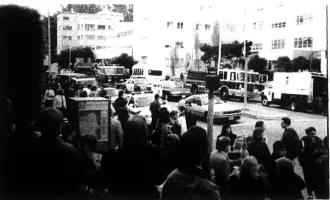AIDS Exhibits at the UCSF Library
The UCSF Library is currently hosting the National Library of Medicine’s (NLM) Surviving & Thriving: AIDS, Politics and Culture. The exhibit highlights the stories of people involved in the AIDS crisis.
It covers the history of the epidemic, including the scientific discovery of the AIDS virus, and the effect of the epidemic on individuals and the country as a whole. It highlights the U.S. government’s initial resistance to the epidemic and inaction during the early years of the crisis, under President Ronald Reagan.
President Reagan did not publicly address the AIDS crisis for five years, and it was only 10 years after the outbreak of the epidemic that the U.S. Congress passed legislation providing AIDS treatment for low-income and under-served citizens.
Political activism eventually led to changes in the testing of AIDS drugs, and to the provision of new methods of treatment, as well as allowing for women with AIDS to receive treatment. The initial definition of the disease did not acknowledge the possibility that women could suffer from AIDS. As a result, they were not allowed to be given the diagnosis if they had contracted the disease and could not receive access to care even as they perished from AIDS.
Many dedicated health professionals and activists continue to work together to find new ways to care for those with HIV/AIDS and to prevent the disease from spreading.
The exhibits will be on display until January 4, 2014, at the UCSF Library, Parnassus Campus, main floor http://bit.ly/ucsflib.
Adjacent to the NLM exhibit (http://1.usa.gov/19mQCbV) is another exhibit, The UCSF AIDS History Project: Documenting the Epidemic, http://bit.ly/ucsfAHP.
The UCSF AIDS History Project (AHP) began in 1987 as a joint effort of historians, archivists, AIDS activists, health care providers and others to secure historically significant resources of the response to the AIDS crisis in San Francisco. The UCSF Archives and Special Collections began receiving grants in 1991 to collect and describe materials related to the epidemic.
The AHP contains records from community-based organizations and other agencies; diaries and personal papers of AIDS activists; papers from local health practitioners who worked with AIDS patients or in HIV/AIDS research, and papers and ephemera collected by journalists and social scientists.
Materials from several AHP collections are displayed in the exhibit, and additional materials may be viewed by appointment in the Special Collections Reading Room. This exhibit will be displayed at the library for the next six months.


